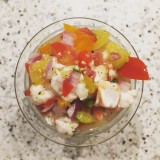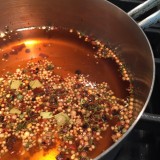So I just came upon this New York Times article on the best (ie. most nutritional) ways to cook vegetables. It says
The amount and type of nutrients that eventually end up in the vegetables are affected by a number of factors before they reach the plate, including where and how they were grown, processed and stored before being bought. Then, it’s up to you. No single cooking or preparation method is best.
So first, that’s real helpful right? an article that is titled “Finding the Best Way to Cook All Those Vegetables” that then concludes there’s no “best” way. But in a way that’s good, it avoids supporting the “everything must be steamed” craze we had a few years ago (not that I’m anti-steaming, just please put a little salt, pepper, herbs, butter…something on them when they’re done, otherwise bo-ring). One of the things I found most interesting in this article was that eating raw vegetables is not always the best way to get the vitamins and nutrients and phytochemicals (yes, scientific word, Alton Brown would be proud) out of the food, which is great, since I’m not particularly a fan of raw vegetables (except carrots, celery and cucumber I’ll take those with ranch dip or hummus anytime). The article concludes that any way we can get people to eat veggies is good, and having a little fat with the vegetable, butter with the broccoli, or mozzarella with your tomatoes, can actually help you absorb more nutrients. As long as people think something tastes good, they’ll eat it, even when it’s actually good for them. The study only looked at boiling, steaming, microwaving and pressure cooking…wonder how grilling affects the nutritional value (aside for the token bit of added carbon from the lovely grill marks) or sauteeing (in a wok perhaps ;)).
But in a way that’s good, it avoids supporting the “everything must be steamed” craze we had a few years ago (not that I’m anti-steaming, just please put a little salt, pepper, herbs, butter…something on them when they’re done, otherwise bo-ring). One of the things I found most interesting in this article was that eating raw vegetables is not always the best way to get the vitamins and nutrients and phytochemicals (yes, scientific word, Alton Brown would be proud) out of the food, which is great, since I’m not particularly a fan of raw vegetables (except carrots, celery and cucumber I’ll take those with ranch dip or hummus anytime). The article concludes that any way we can get people to eat veggies is good, and having a little fat with the vegetable, butter with the broccoli, or mozzarella with your tomatoes, can actually help you absorb more nutrients. As long as people think something tastes good, they’ll eat it, even when it’s actually good for them. The study only looked at boiling, steaming, microwaving and pressure cooking…wonder how grilling affects the nutritional value (aside for the token bit of added carbon from the lovely grill marks) or sauteeing (in a wok perhaps ;)).







